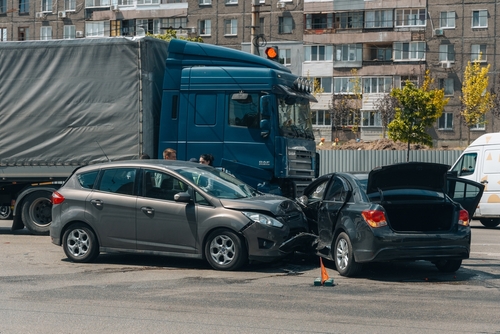When a commercial truck is involved in a fatal collision, a series of investigations begin almost immediately, involving police, government agencies, and insurance companies. The sheer size and weight of these vehicles mean that the consequences are usually catastrophic, leaving families to grapple with a sudden and profound loss.
In the wake of such a tragedy, the truck driver may face both criminal charges from the Crown and be named in a civil lawsuit for wrongful death brought by the surviving family members. This process is separate from any insurance claims. The goal of a wrongful death claim is to secure financial stability for the family who has lost a loved one, covering losses like income, care, and companionship.
If you have a question about your family’s situation after a fatal truck accident, call MNH Injury Lawyers at (888) 664-5298 for a no-charge consultation.
The Immediate Aftermath: Multiple Investigations Begin

The moment a fatal crash involving a large commercial truck occurs, the scene becomes the starting point for several overlapping and independent investigations, and this is when it becomes vital to Choose a Personal Injury Lawyer who can protect your family’s rights and guide you through the process.
Who Investigates a Fatal Truck Accident?
Several bodies will launch their own inquiries, and their findings will affect criminal and civil proceedings.
- Police Services (Municipal or Provincial): The police are typically the first to arrive. Their primary role is to determine if any criminal laws were broken. They secure the scene, gather physical evidence like skid marks and vehicle debris, and speak with any available witnesses. Specialized Collision Reconstruction Units will analyze the data to figure out the sequence of events that led to the crash. Their focus is on whether to lay charges under the Criminal Code or the provincial Highway Traffic Act.
- The Ministry of Transportation (MTO): In many Canadian provinces, the MTO or a similar provincial body will conduct its own parallel investigation into a commercial vehicle accident. Their investigators are specialists who focus on regulatory compliance and the mechanical fitness of the truck. They will inspect the vehicle for safety defects in its brakes, tires, or lights, and they will review the driver’s logbooks and the company’s maintenance records to check for compliance with safety standards. This investigation is important for determining if negligence extends beyond the driver to the trucking company itself.
- The Trucking Company and Their Insurer: The trucking company and its insurance provider will immediately launch their own investigation. Their objective is to understand what happened from their perspective and to assess their financial liability. They will often dispatch their own investigators and accident reconstructionists to the scene.
What Happens to the Truck Driver?
After a fatal truck accident, the driver can find themselves facing two distinct legal proceedings that run on parallel tracks: a criminal case and a civil lawsuit. These two processes have different goals, different standards of proof, and proceed independently of one another, making it important to Contact a Lawyer who understands both sides of the process.
Will the Truck Driver Go to Jail? The Criminal Process Explained
The decision to press criminal charges rests with the police and the Crown Attorney. This decision is based entirely on the evidence collected during the police investigation, which must show a level of behaviour that goes far beyond a simple mistake.
Potential criminal charges include:
- Dangerous Operation Causing Death: This charge may be laid if the driving behaviour is found to be a “marked departure” from the standard of a reasonably prudent driver. This is more than simple carelessness.
- Criminal Negligence Causing Death: This is a more serious charge. It requires conduct that shows a “wanton or reckless disregard” for the lives or safety of others.
- Impaired Driving Causing Death: If the police investigation reveals evidence that the driver was impaired by alcohol or drugs, this is one of the most serious charges a driver can face, with a maximum penalty of life imprisonment.
Note that a criminal conviction is not required to pursue a civil claim for compensation. The two processes are entirely separate, and a finding of “not guilty” in criminal court does not prevent a family from succeeding in a civil lawsuit.
The Civil Claim: Holding the Driver Accountable for Your Family’s Losses
A civil lawsuit, specifically a wrongful death claim, is the legal avenue your family can use to seek financial compensation for your losses. This claim is filed against the at-fault driver directly, and as we will discuss, usually their employer as well.
The purpose of a civil claim is not to punish the driver with jail time, but to compensate your family for the tangible and intangible losses that result from your loved one’s death. This is about providing financial stability for the future, and in some cases, Car Accident Claims Go to Court when fair compensation cannot be reached through settlement.
The standard of proof in a civil case is lower than in a criminal case. In a criminal trial, the Crown must prove guilt “beyond a reasonable doubt” (>~95% likely). In a civil case, we only need to prove on a “balance of probabilities” that the driver’s carelessness (legally known as “negligence”) was more likely than not the cause of the death (>~50% likely).
Is the Trucking Company Also Responsible?
In almost every case involving a fatal collision with a commercial truck, the responsibility does not end with the driver. The company that owns the truck and employs the driver is also legally accountable for the harm caused. This is a fundamental aspect of Canadian law that helps ensure families have access to the resources they need.
How Can a Company Be at Fault for a Driver’s Mistake?
Canadian law recognizes that a trucking company’s actions—or lack thereof—can be a significant contributing factor in a fatal accident. Two main legal principles allow us to hold the company accountable, which is why knowing When to Hire a lawyer becomes critical for protecting your family’s rights.
- Vicarious Liability: This is a legal concept that simply means employers are generally responsible for the wrongful acts of their employees while they are on the job. If the truck driver was performing work duties at the time of the crash, their employer is almost always also legally responsible for the consequences. The law reasons that since the company benefits from the employee’s work, it should also bear the risks associated with that work.
- Direct Negligence by the Company: Beyond being responsible for their driver’s actions, a company can also be found directly negligent. Our investigation will look for evidence of systemic failures, such as:
- Inadequate Hiring and Training: Did the company hire a driver with a known poor safety record? Was the driver properly trained on the specific type of vehicle they were operating?
- Poor Maintenance: Were there known mechanical issues with the truck, such as faulty brakes or worn tires, that the company failed to repair? We will review all maintenance logs and inspection reports to uncover any such failures.
- Encouraging Unsafe Practices: Did the company pressure drivers to ignore their legally mandated hours-of-service limits to meet tight delivery deadlines? Driver fatigue is a known cause of serious accidents, and evidence of a company culture that prioritizes speed over safety could be a key factor in establishing liability.
Why Does Suing the Trucking Company Matter?
Access to Higher Insurance Limits
Commercial trucks are required by law to carry much larger insurance policies than standard passenger vehicles. This is because the potential for catastrophic damage and loss is so much greater. The financial losses your family is facing—from lost income over a lifetime to the loss of care and companionship—are likely substantial. Naming the company in the lawsuit ensures there are adequate resources to cover these losses.
Holding the System Accountable
By bringing a claim against the company, you help shine a light on systemic safety issues within that organization. This commonly leads to changes in their policies and procedures, potentially preventing another family from experiencing a similar tragedy.
The Wrongful Death Claim Process

When a loved one is lost because of someone else’s negligence, the law provides a way for the family to seek stability and security. This is done through a “wrongful death” claim. It is a civil action designed to address the profound financial and personal impact on the surviving family members and to hold the responsible parties accountable after a wrongful death.
What is a “Wrongful Death” Claim?
In Alberta, this type of claim is governed by the Fatal Accidents Act. It is a legal action that allows specific surviving family members to recover damages for the losses they have personally suffered due to their loved one’s death.
The goal is to put the family in the financial position they would have been in had their loved one survived, as much as that is possible through financial compensation. It acknowledges that the loss is not just emotional but also creates real, quantifiable financial hardship.
What Kind of Compensation Can Your Family Pursue?
Compensation, which is legally referred to as “damages,” is carefully calculated based on your family’s specific losses and is divided into different categories. These include:
- Loss of Financial Support: This calculation projects the income your loved one would have earned and contributed to the family over their expected lifetime.
- Loss of Care, Guidance, and Companionship: The law recognizes the profound, personal loss of a parent, spouse, or child. While no amount of money can replace them, a value is placed on this intangible loss to acknowledge its significance.
- Funeral and Burial Expenses: This covers the direct, out-of-pocket costs associated with the funeral, burial or cremation, and other final arrangements.
- Medical and Other Out-of-Pocket Expenses: Any medical costs incurred between the time of the accident and the time of death, as well as other related expenses, can be claimed.
- Household Services: This compensates the family for the value of services your loved one provided. This could include things like childcare, home maintenance, cooking, financial management, and other contributions to the household.
Frequently Asked Questions About Fatal Truck Accidents
What if my loved one was partially at fault for the accident?
In Canada, a legal principle called “contributory negligence” may apply. This means that if your loved one’s actions are found to have contributed to the collision, any compensation awarded could be reduced by the percentage of fault assigned to them. For example, if they were found 25% at fault, the total compensation would be reduced by that amount. However, even if they are found partially to blame, your family may still be entitled to a significant recovery. Our role is to analyze the evidence and ensure no amount of blame is unfairly placed on them.
The insurance company for the trucking firm has already called me. What should I do?
You are not obligated to provide a statement to the trucking company’s insurer. It is advisable to consult with an Edmonton truck accident lawyer before engaging in any detailed communication with them. The insurer’s role is to represent their client’s interests, which often involves managing and minimizing the amount they have to pay out. Any statement you provide could be used to argue against your family’s claim later on.
How long will a wrongful death lawsuit take?
They can take several years to resolve, particularly if they need to proceed to a trial. However, the majority of cases are settled out of court through processes like negotiation or mediation, which sometimes leads to a resolution sooner.
How much does it cost to hire a lawyer for this?
At MNH Injury Lawyers, we handle these cases on a contingency fee basis. This means you do not pay any legal fees upfront or out of your own pocket. Our fees are paid as a percentage of the final settlement or award we recover for your family. If we are not successful in recovering compensation, you do not pay any fees.
What is the difference between the police report and our own investigation?
The police report is an important document, but its primary focus is on determining criminal fault and the immediate cause of the crash. Our investigation goes much deeper. We may hire our own engineers and industry insiders to analyze the evidence. We look for things the police may not focus on, such as evidence of company negligence, patterns of maintenance failures, violations of federal safety regulations, or a corporate culture that encourages unsafe driving practices. This is also why it matters to know how to choose the right Calgary car accident lawyer, since the right legal team will go beyond the basics and uncover the details that strengthen your claim.
Your Family Deserves Answers. We Can Help You Find Them.

The path forward after a devastating loss is never easy, but you do not have to walk it alone. Let our team handle the investigation and the legal claim. This allows you to focus on what is most important: healing with your family.
For a confidential and no-charge discussion about your situation, call MNH Injury Lawyers today at (888) 664-5298.
